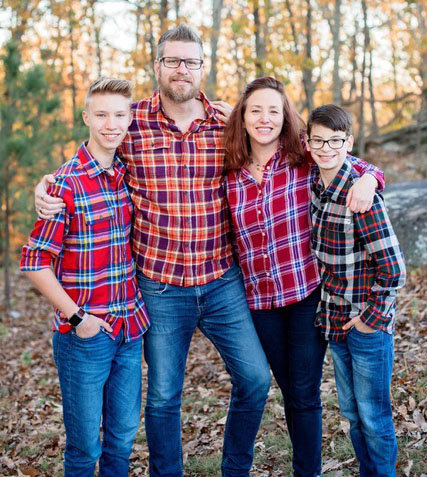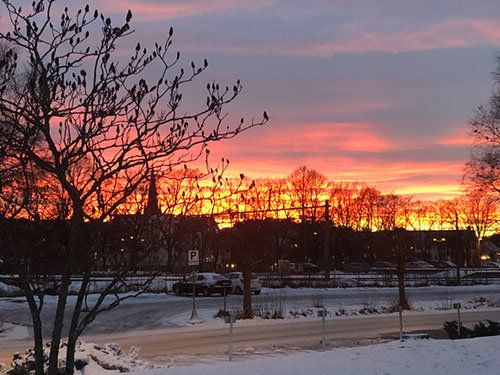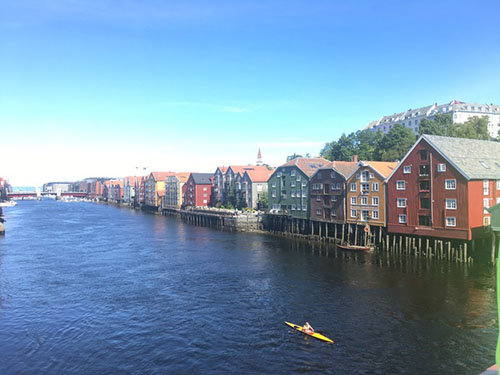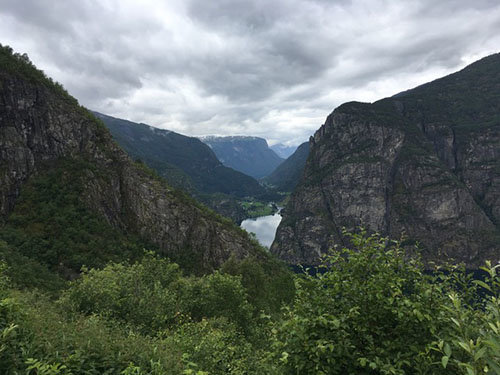 The Doves are, left to right: William, Zach, Jenn and Daniel. Their ministry in Norway is challenging, but they are making a significant impact for Christ. DOVE FAMILY/Special
The Doves are, left to right: William, Zach, Jenn and Daniel. Their ministry in Norway is challenging, but they are making a significant impact for Christ. DOVE FAMILY/SpecialDULUTH — Zack and Jenn Dove recently spoke in chapel at the Georgia Baptist Missions and Ministry Center and their presentation was so interesting and compelling that I wanted our readers to get a glimpse into their lives. After this brief introduction I want you to read this interview all the way through the last question. I think you will be astonished and grieved at the Doves’ honest and forthright answer to the final inquiry.
Zack and Jenn Dove, originally from Georgia, are IMB missionaries, church-planting catalysts, to be exact, in Sandefjord, Norway, a town of approximately 60,000. They moved to Norway in 2012 with their sons: William and Daniel. Officially, the Doves are team leaders for West Nordic, which includes Norway, Denmark, Iceland, and Sweden.
The Doves partner with the Baptist church in Sandefjord and their primary role is focusing on serving and connecting with those who are not actively participating in church gatherings/events and find way to invite others into the church. They also help with worship, teaching, and facilitating discussions, as well as serving in the community. Consequently, in recent months the church has begun to show signs of growth and renewed enthusiasm.
The Christian Index: Zack, please rehearse briefly for me how God called you to mission and how Jenn affirmed that she knew God was going to call you to missions?
Zack Dove: God began speaking to Jenn and me individually around 2007. Not in an audible voice, but through various circumstances, other believers, travel, prayer, and time in the Word. We had served in some volunteer positions in church, but never in a missions role. In 2009, while on a mission trip with our home church to Norway, I felt Him impressing on my heart how sin has cast a shadow on Norway. This stuck with me and I just couldn’t seem to shake it.
Even so, I returned home and went back to life as normal. It wasn’t until the following year, in late 2010, that I experienced another pivotal moment. While with my accountability group, my mentor challenged me and I knew at that point that God was asking me to move my family to Europe. I went home and approached Jennifer with the news, and her answer was simply, “I know.” She had casually mentioned a few times in the past months that she wondered if God wanted us to move out of the country, and had since been fervently praying that God would speak to and reveal this same plan to me.
The Christian Index: What is the state church like in Norway? What would one of their services look like?
Zack and Jenn Dove: Norway has a national church (formerly the state church, Norway changed the constitutional wording from “the state’s public religion” to “Norway’s national church” effective January 1, 2017). The national church is Lutheran. In most ways, the doctrine and theology are sound. The church does, however, uphold the practices of christening and of confirmation at age 15.
One article we recently read stated (loose translation), “About 70 percent of the population are members [of the Norwegian national church]. Although the membership rate is high, this does not necessarily mean that religion has a prominent place in everyone's life. But the church is still important for most residents at ceremonies such as christening, confirmation, weddings and funerals, as well as around Christmas.”
 Norway's sunsets are breathtaking, but the lack of sunlight during the winter months lead to seasonal affective disorder on the country's residents. DOVE FAMILY/Special
Norway's sunsets are breathtaking, but the lack of sunlight during the winter months lead to seasonal affective disorder on the country's residents. DOVE FAMILY/SpecialWe are living amongst a people who, for the most part, have embraced a purely cultural Christianity. While membership is quite high, most people are members from childhood (following christening and/or confirmation) and do this primarily so that they can have their weddings and funerals in the church. However, in late 2016 Norway made it possible to both sign up and “opt out” of church membership online. In less than one month following the website going live, more than 25,000 had left the church.
Traditional Lutheran services are liturgical. They are led by a priest, with a lot of ceremony, standing and sitting, reciting texts, and singing formal/liturgical songs. There is typically a message delivered by the priest, based on a passage or verse from scripture.
The Christian Index: You indicated that the people in Norway are happy, but later qualified that by saying that many are suffering from depression. Is their happiness superficial?
Zack and Jen Dove: Norway is typically voted one of the happiest countries in the world. In 2018, they were #2 (#1 in 2017, #4 in 2016, and #4 in 2015). These reports measure happiness based on things like “income, healthy life expectancy, social support, freedom, trust, and generosity.” Norway is a society that is proud of its ability to care for each other. But as we mentioned, this usually is in reference to meeting the physical needs of all the people in Norway.
 The colorful buildings that line the waterfront in Norway are as artist’s paradise. DOVE FAMILY/Special[/caption]
The colorful buildings that line the waterfront in Norway are as artist’s paradise. DOVE FAMILY/Special[/caption] Education, health care, employment, and social support are always available for those who desire them. But Norway is also a society of independent people. While there is an inherent sense of conformity, people are also quite individualistic. Most keep their worlds small in terms of social life and tend to do their own thing.
Many move away for university, only to return to their hometowns and childhood friends once they’ve married. Those who are transplants in new cities often struggle to connect well with others or find a sense of community. Seasonal affective disorder is a big problem in Norway, due to the long dark winter months. But there is also a serious problem with diagnosed cases of depression and anxiety. Loneliness seems almost taboo, yet it also seems to linger under the surface of so many lives.
Based on all of this, maybe the word “happiness” is not entirely accurate. People are secure in a physical sense, but there often seems to be an underlying longing for encouragement, and for hope.
The Christian Index: Norway has been called a crossroads for people from all over the world to connect. How does that impact your ministry?
Zack and Jenn Dove: Norway has been historically very homogeneous. But in recent years, immigration has increased and the human landscape has changed. Even in our smaller town, it is becoming more common to see a variety of skin tones and hear a variety of languages.
 The fjords of Western Norway are some of the longest, deepest, narrowest and most beautiful fjords in the world and Norway has thousands of them. DOVE FAMILY/Special
The fjords of Western Norway are some of the longest, deepest, narrowest and most beautiful fjords in the world and Norway has thousands of them. DOVE FAMILY/SpecialFor our first two or three years, we worked really hard to learn language and culture and to connect almost exclusively with Norwegians. We worked hard to avoid falling into a purely expat community, because we felt a clear call to reach the people of Norway, and we knew it could be easy to get in with non-natives and miss out on the people of this beautiful country. The majority of the work we do in Norway is in the Norwegian language and among Norwegian people.
However, about two years ago, after several people approached us asking for some sort of Bible group in English, and after much prayer, we worked with several others to begin an English language Bible study. We now have people from 12 different countries that attend – some believers, some seekers. We even have quite a few Norwegians in the group who were seeking more outlets and opportunities for both study and fellowship.
We realize that there is diversity in our town, and now we have different groups and churches that we can invite people to join based on their backgrounds and language abilities.
The Christian Index: Are other Christian denominations having good success at church planting? Are there Baptist churches there that are doing well?
Zack and Jenn Dove: The Mission Church of Norway is a fairly conservative denomination with around 11,000 members and about 75 churches. We have partnered over the past four years with a new church plant in our city (Sandefjord) that is part of this network. The Pentecostal Church of Norway has about 40,000 members and is probably the largest denomination behind the national church (with 3.7 million, or about 70 percent of the total population). There is also a limited presence of Methodists and Presbyterians, as well as a small house church movement. We have also partnered with the house church network.
The Norwegian Baptist Union currently reports its membership at around 12,000, with just over 100 churches nationwide. Most of the growth being experienced right now in the Baptist Union comes from immigrant congregations. Many Norwegians we encounter are not familiar with the Baptist Church. We partner with the Baptist Church in our city of Sandefjord, and also have relationships and connections with several other Baptist Churches and with some of the national leadership.
The Christian Index: In a spiritually depressed country how do you find nourishment for your own soul?
Zack and Jenn Dove: To be totally honest and transparent, it can be discouraging at times. Finding fellowship with other believers is very important. We are also continually coming back to God’s call on our family. There are days that we might easily feel discouraged or question if we should continue in Norway, were it not for God’s call. We have always believed in the power of prayer, but that has become even clearer to us while living in Northern Europe.
The Christian Index: What are the ages of your sons and how are they handling life in Norway?
Zack and Jenn Dove: William is 16, and Daniel is 13. They were 10 and 8 when we first arrived in Norway. Our boys have experienced more change in their childhoods than many people will experience in their entire lives. But they have approached each change with positive attitudes and have been true “door openers” for conversations, for relationships and for ministry. They really are an encouragement to us.
 Navigating the fjords provide for spectacular views and great photo opportunities. DOVE FAMILY/Special
Navigating the fjords provide for spectacular views and great photo opportunities. DOVE FAMILY/SpecialOf course, the move was not easy, but they really do like living in Norway. They love their school, although it is difficult being the only believers. And they miss family in the states, but they have made friends and gotten involved with sports teams and activities.
They do miss out on being a part of youth group, as very few churches here have enough young people to have a youth group. We are thankful for other adult believers who spend time with them, even when it’s something as simple as taking them out for pizza or a round of disc golf. And being a part of the regular church services with the adults has led them to get more involved in conversations and studies, but it is also a challenge as they don’t get to spend much time with other believers close to their age.
The Christian Index: What has been the greatest victory in your ministry in Norway?
Zack and Jenn Dove: It’s hard to name just one thing as our greatest victory. Seeing people come from darkness to light and watching Jesus work through them is something that cannot be described with mere words. We’ve witnessed lives radically changed through the Gospel, and new believers with a hunger to learn and grow in their walk.
We are also excited about a number of people who were already believers, now maturing and being discipled, discipling others, and engaging in evangelism. Many of these practices are not always a part of the faith communities in Norway and have not been actively encouraged or modeled.
The Christian Index: You said that Norway is 95 percent Christian, but there is no substance to their avowed Christianity. Do you see America headed in the direction of Norway in that regard?
Zac3 and Jenn Dove: Operation World reports Norway to be 91 percent Christian, and 8.4 percent Evangelical. Joshua Project’s numbers for Norway are 88.5 percent Christian and 8.15 percent Evangelical, with ethnic Norwegians at 95 percent and 9 percent, respectively. Both sources report annual evangelical growth at 1 percent.
The numbers reported by Norway are generally based on church membership. But as mentioned before, many in Norway are church members from age 15 (once they’ve gone through confirmation), yet very few actually attend any church services or have faith or religious practice as an active part of their daily life.
And even these numbers are likely to begin showing signs of decline in the coming years as more people opt out of church membership and more teens choose either not to go through confirmation at all, or to confirm themselves humanitarian rather than through the church.
We have now been living and serving in Norway for five years. When we first moved there, we could see a marked difference in the religious climates of Norway and the United States. Upon arrival, we saw Norway as clearly post-modern or even secular. It was unusual to encounter a person on the streets who had true belief in Jesus as Savior. Conversely, particularly in our home state of Georgia, it was the exception to meet someone who didn’t at least mention an area church they regularly attended, and the majority we met was active in their Christian walk.
However, each time we return to the states, we’ve seen the gap between these two cultures narrowing, and not in a positive way. Norway is not becoming more like the states. The United States seems to be becoming more like Norway and Northern Europe. Secularism and post-modernism seem to be seeping into the culture at a concerning if not alarming rate.
Prayer Requests